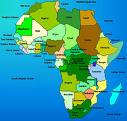The Conquest of Africa: NATO Wages War On Third Continent

At its summit in Lisbon, Portugal last November the North Atlantic Treaty Organization adopted its first strategic concept for the 21st century, one in keeping with its expansion into not only a pan-European but a self-styled international military force.
In addition to subordinating all of Europe to a U.S.-dominated interceptor missile system, complementing the new U.S. Cyber Command in waging cyberwarfare defensive and offensive, and erasing whatever distinction remained between NATO and European Union military functions on the continent and globally, the world’s only military bloc endorsed the nearly ten-year-old war in Afghanistan as its prime mission and affirmed its commitment to ongoing operations in the Balkans.
Almost all of the approximately 150,000 foreign soldiers in Afghanistan are currently under the command of the NATO-run International Security Assistance Force, which is also conducting deadly helicopter gunship raids and artillery attacks inside neighboring Pakistan.
The war in South Asia is NATO’s first armed conflict outside Europe and its first ground war. Its bombing campaign in Bosnia in 1995 and 78-day air war against Yugoslavia four years later were its first hostile military actions.
NATO is now waging a war in a third continent, Africa.
The Alliance’s summit last year placed particular emphasis on consolidating partnerships with nations outside Europe and North America; military relations and agreements with, counting NATO members and partners alike, over a third of the 192 members of the United Nations.
Mechanisms employed to extend NATO’s influence and operations worldwide include the Partnership for Peace, Mediterranean Dialogue, Istanbul Cooperation Initiative, the Contact Countries format, the NATO-Afghanistan- Pakistan Tripartite Commission and the NATO-Russia Council.
Five of the seven members of the Mediterranean Dialogue – Algeria, Egypt, Mauritania, Morocco and Tunisia – are African states.
With U.S. Africa Command achieving full operational capability on October 1, 2008, the whole continent has been placed under an American overseas military command (Egypt remains in U.S. Central Command’s area of responsibility) , with plans underway to replicate that arrangement with NATO. [1]
U.S. Africa Command (AFRICOM) assumed control of what is now a 12-day war against Libya, the only North African nation not subordinated to AFRICOM or CENTCOM and to binding NATO obligations, through its Joint Task Force Odyssey Dawn.
With NATO assuming direct command of the war – air and cruise missile strikes, a naval blockade of the country, on-the-ground operations in conjunction with anti-government insurgents and afterward independently – AFRICOM and NATO are being merged into one warfighting force.
In addition to that unprecedented integration, two members of NATO’s Istanbul Cooperation Initiative – Qatar and the United Arab Emirates – are providing warplanes for Operation Odyssey Dawn and in the process engaging in a joint campaign with both NATO and AFRICOM for the first time. (The United Arab Emirates is one of 48 Troop Contributing Nations for NATO’s Afghan war and Bahrain, another Istanbul Cooperation Initiative partner, is supplying security forces for the International Security Assistance Force. Mediterranean Dialogue member Egypt is also an unofficial force contributor for NATO in Afghanistan. )
When on March 28 President Barack Obama repeatedly mentioned the international community and “international partners” and the “broad coalition” conducting the war against Libya along with the Pentagon, he could only cite eleven allies so involved: “[N]ations like the United Kingdom, France, Canada, Denmark, Norway, Italy, Spain, Greece, and Turkey…all of whom have fought by our side for decades [and] Arab partners like Qatar and the United Arab Emirates.”
Nevertheless, Washington has brought together North American and European NATO allies with Persian Gulf partners for a war in Africa, the latest step in solidifying an international military alliance under U.S. control, complementing the building of an Asia-Pacific NATO, consolidating military partnerships in the Persian Gulf and throughout the Middle East and integrating former Soviet republics in Eastern Europe, the South Caucasus and Central Asia into the Pentagon-NATO network.
Military operations currently under AFRICOM’s Joint Task Force Odyssey Dawn and within hours to be transferred to NATO have included over 1,800 sorties and 214 Tomahawk cruise missile attacks since the beginning of the war on March 19.
NATO’s Lisbon summit declaration of last November highlighted an expanding role for the bloc in Africa, including supporting the African Union Mission in Somalia (AMISOM), for which it has airlifted thousands of Ugandan troops for combat in the nation’s capital, the Operation Ocean Shield naval operation off the Horn of Africa and the operationalization of the African Standby Force, modeled after the NATO Response Force.
In twelve years the U.S. has used NATO for the war against Yugoslavia – the first unprovoked attack against a sovereign European nation since World War Two – a nearly decade-long air and ground war in Asia, and now the opening stages of a war in Africa. None of those wars were launched either to defend a member of NATO or in the so-called Euro-Atlantic area the military bloc arrogates to itself the right to protect.
21st century NATO is a global military strike force to be employed wherever its leading member states, the U.S. in the first case, choose to use it. Other nations in Africa, the Middle East, Asia, the Caucasus and even what is left of unsubjugated Europe had best take note of the fact.
Note
1) Africa: Global NATO Seeks To Recruit 50 New Military Partners
Stop NATO, February 20, 2011
http://rickrozoff. wordpress. com/2011/ 02/20/africa- global-nato- seeks-to- recruit-50- new-military- partners
Stop NATO e-mail list home page with archives and search engine:
http://groups. yahoo.com/ group/stopnato/ messages
Stop NATO website and articles:
http://rickrozoff. wordpress. com

